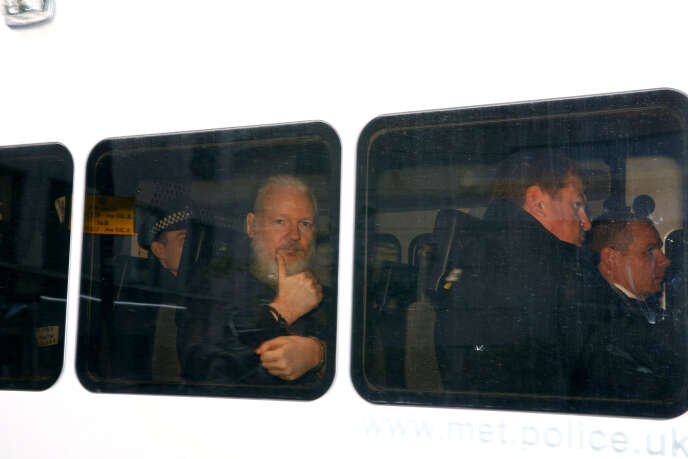
If the United States expands its indictment of the WikiLeaks founder, arrested April 11, from hacking to charges related to publishing matters in the public interest, it is freedom of information that could be targeted.
Julian Assange, the founder of WikiLeaks, was arrested on Thursday, April 11 by U.K. police in the Ecuadorian Embassy in London, where he has taken refuge for nearly seven years. He was arrested on two charges: violating his parole in 2012 (he faces up to one year in prison in the United Kingdom), and in connection with an American extradition request for helping a military analyst obtain confidential government documents. (He faces up to five years in prison in the United States on that charge.)
Before raising the issue of what will happen to whistleblowers in the fight against state secrets, it is necessary to clarify two points. First, Assange is answerable to the law like everyone else. His involvement with the Swedish police began when he refused to respond to a summons for questioning after two women accused him of sexual assault. Assange refused to respond at that time on the far-fetched belief that Sweden would deliver him to the CIA. He was wrong to refuse to respond to these serious accusations.
Secondly, Assange is no friend of human rights. When, in 2010, he approached five newspapers, including Le Monde, about examining the content of American military and diplomatic documents, the agreement was clear: WikiLeaks had to accept the ethics policy of these five publications, notably a policy that protects sources. The sensitive identities of people living in totalitarian countries whose lives could be in danger were expurgated from the published documents. The following year, Assange went back on his word and published the documents, unfiltered, in their entirety. Le Monde denounced this conduct; other media outlets, on the other hand, continued to support him. The reality is that, on that day, he left the world of human rights defenders to join transparency absolutists, and in doing so delivered a gift to the worst security services on the planet.
What happened next with Assange is complicated, but it showed a guiding principle: The anti-American militant preys on the secrets of democratic countries and rarely those of totalitarian countries. Assange worked for Russia Today, the pro-Vladimir Putin television network financed by the Kremlin. And he used WikiLeaks during the 2016 American presidential campaign to release documents stolen by Russian secret services from the Democratic Party and its candidate, Hillary Clinton, with the aim of discrediting her. As such, he, like Moscow, helped Donald Trump win the election.
The problem with the U.S. indictment is that it aims to avenge the disclosure of the 2010 documents even though it fell under the purview of publication of matters of public interest. The Obama administration had refused to take such a step, its legal experts citing a violation of the First Amendment, which guarantees freedom of expression. It’s the Trump administration that took this leap.
Moreover, Assange’s gamble that Trump would alleviate the legal threats against him proved useless, and the merits of the case worry those who defend freedom of expression. For the moment, the indictment is limited to charges that he helped his source, the military analyst Chelsea Manning, hack a government computer. It is therefore Assange the hacker who will be targeted, which raises questions in itself. But if the indictment extends to charges related to publishing matters in the public interest, then freedom of information could become the target. That would not be acceptable.

Leave a Reply
You must be logged in to post a comment.